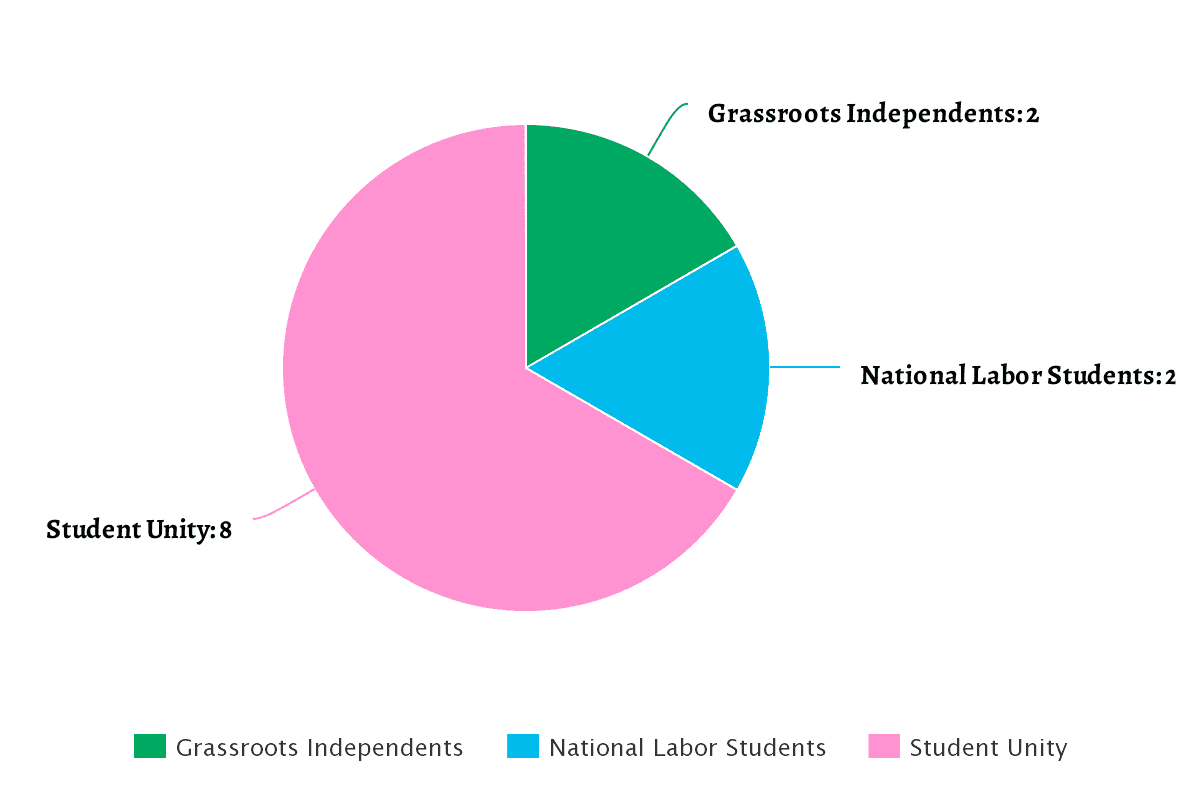Disclaimer: Vivienne Guo is a former member of Sydney Grassroots.
In a break from tradition, the infamously rowdy National Conference (NatCon) for the National Union of Students (NUS) took place on Zoom this year in light of the COVID-19 pandemic. Your friendly neighbourhood Honi editors attended so that you didn’t have to.
SKIP THIS SECTION IF YOU’RE A SEASONED HACK
The NUS is the peak representative body for undergraduate students across Australia, though many students remain unaware of its existence or the (questionable) role that it plays, despite the fact that student money funds the organisation. Indeed, the NUS is funded by universities, through the payment of affiliation fees in order for each university to receive a certain amount of delegates proportionate to their student population. As an affiliated university, the University of Sydney Student Representatives Council pays over $75,000 of student money to the NUS for operational and conferencing costs.
Each year, The University of Sydney receives seven delegate positions. They are currently held by Angelina Gu (Unity), Meredith Eicherly (Unity), Shreyaa Sundararaghavan (NLS), Lily Campbell (SAlt), Jack Mansell (SAlt), Maia Edge (Liberal), and Liam Donohoe (GI).
So how does NatCon and voting work? It is, like all student politics, a factional affair. If you haven’t read our explainer article, here’s a quick breakdown of the conference floor:
- Student Unity (Labor Right): Masquerading as ‘left-wing’ and ‘progressive’ despite regularly working with members of the Liberal Party, SU are historically the largest faction in the NUS, controlling 45%* of delegates.
- Grassroots Independents (Broad Left): Casually referred to as Grindies, this profoundly underwhelming faction claims a broadly left-wing stance (though their voting patterns don’t always reflect this). Grindies have seen a swell in numbers this year, holding 22%* of delegates on the conference floor. Grindies lay claim to esteemed former SRC President Liam Donohoe, though Donohoe’s voting record shows a significant deviation from the rest of the faction.
- National Labor Students (Labor Left): NLS prides itself on holding the NUS presidency for every year since its inception, though how much of this is attributed to the actual competence of their candidates is up for discussion. As a broadly left-wing faction, NLS votes fairly predictably, often voting further left than Grindies. NLS hold 20%* of delegates at NatCon, bringing them to the third most prominent faction after Grindies despite traditionally being the second.
- Socialist Alternative (Trotskyist Left): Arguably the rowdiest faction present at NatCon, SAlt are infamous for patting themselves on the back at every given opportunity, claiming to do the lion’s share of activism everywhere. Their voting pattern reflected a more consistently left-wing position. As a smaller faction, they hold 11%* of delegates on the floor.
- Australian Liberal Students’ Federation (Right): The Libs were curiously absent from NatCon this year, despite USyd Delegate Maia Edge telling Honi that she would be in attendance. They hold a meagre 1%* of delegates. Know when to admit defeat?
*These numbers are only rough estimates and not intended to be precise projections.
Though NatCon 2020 was originally intended to be spread over three days of pandemonium, this year’s was cut tragically (or blissfully) short due to the unusually speedy process of the conference. In truth, it was a bland occasion. Sadly, the conference lacked much of its usual chaotic flare, with no heckling to be heard in the Zoom, ostensibly due to the muting function available on the platform which consistently cut off the lengthy speeches of Socialist Alternative members. Boring! Policy and motions were voted on during Day 1 and 2, with report backs from 2020 office bearers and candidate statements from next year’s office bearers given in the second half of Day 2.
THIS IS WHERE IT GETS SPICY: POLICIES AND MOTIONS
NatCon debates are broken into eight different policy sections in relation to various portfolios and topics: Education, Welfare, Women’s, LGBTI, Disability, First Nations, International, Ethnocultural and Small and Regional Campuses.
There were also a number of urgency motions, another new feature of this year’s unconventional conference, which encompass motions and amendments that were ‘urgently’ submitted after the deadline, and can be about any topic matter relevant to students and the NUS.
For the most part, motions were carried or voted down swiftly. In the humdrum, certain motions were notable. The conference took a controversial turn when two motions were put by Socialist Alternative members pertaining to the removal of a policy point that made the argument that toxic masculinity contributes to the underreporting of domestic and family violence. The motions, titled ‘Men are not oppressed for being men’ and ‘It’s not about men’ respectively, split the votes on the conference floor with support from Socialist Alternative, NLS and one Liam Donohoe (who technically remains affiliated with Grassroots Independents). Unity and the majority of Grassroots Independents notably abstained and/or voted against. The motions failed. If you listen hard enough, notorious men’s rights activist Bettina Arndt can be heard cheering in the distance. Grim!
In the Women’s Policy, a motion was put by Socialist Alternative to remove Clause 9 of the Sexual Harassment and Harassment Prevention section in the Women’s Chapter, which endorses the presence and hiring of female security services on campuses. Supporters of the motion argued that student unions shouldn’t advocate for universities to expand their security forces, which often control student organising and activism. The motion ultimately failed; real #girlboss moment!
The Ethnocultural Chapter saw one of the most contentious moments of the conference, with Student Unity moving a motion to remove a number of points in the NUS National Policy platform regarding opposition to war and militarism. This would overturn its recognition of the destructive role that Australia has played in military interventions and its rejection of the idea that militaries are a force of good among other points; which is not a great look considering the recent revelations about Australian war crimes in Afghanistan. The motion failed.
A number of amendments to urgency motions raised en bloc by Unity sought to cut NUS’ material support for student protests, including printing of materials, support for student protesters paying fines, and involvement in the organising of various campaigns such as abortion access, anti-transphobia and Black Lives Matter. After a moment of confusion from the Grassroots Independents, who accidentally voted in favour of the changes and requested a recount, the controversial amendments still passed.
In less hotly disputed moments of the conference, motions were passed to increase support for regional campuses and international students. The NUS reiterated the importance of opposing the police and Australia Day in the First Nations Policy chapter. Student Unity also voted against the right to protest.
ET TU, DEMOCRACY?
A number of complaints were raised during the webinar conference regarding democracy and transparency. For the start of NatCon, attendees could only see the host — 2020 NUS President Molly Willmott (NLS). Willmott was the only one with access to a view of everyone else on the floor and their voting decisions. There was immediate dissent in the chat, with some denouncing it as “undemocratic.” Outgoing Ethnocultural Officer Vinil Kumar (SAlt) went as far as saying it was the “most un-transparent method of voting” they had ever seen.
Another delegate complained about the lack of clear, accessible information in regard to the functioning of the conference. Grassroots Independents claimed they had not been sent the supplementary motions and amendments to motions which had misguided their vote.
Allegations were made against 2020 General Secretary Sam Roberts (SU) after a supposed call to Natalie Acreman (SAlt) wherein he allegedly threatened to block SAlt from moving any more motions if they moved more procedurals.
Honi was also tipped that a coup was staged two days before NatCon against presidential hopeful Josh Rayner (NLS), which resulted in Rayner’s ambitions being thwarted by now incoming NUS President Zoe Ranganathan (NLS). Honi noted that Rayner was absent from the conference, along with other members of South Australia’s NLS chapter, due to the allegedly unfair democratic process within NLS.
A STUDENT UNITY DIVIDED
Honi has heard whispers of a rift in Student Unity. It appears that NSW Unity are in turmoil after their NSW State Convenor failed to secure the preselection of a NSW Unity member to a National Office bearer position. As if this wasn’t already enough chaos, it seems that UTS Unity also broke ranks and proxied away their votes. RIP Student Unity, you will not be missed.
WHERE’S LINCOLN?
National Education Officer Lincoln Aspinall (GI) was the subject of significant controversy and the hottest topic of NatCon; he has been repeatedly condemned by Socialist Alternative for his glaring lack of involvement in the education campaign in a year, which has faced an onslaught of staff and course cuts, university austerity measures and the passing of the Job-Ready Graduates Bill in October which was fervently opposed by students and staff across the country. Some particularly colourful insults were thrown around, with Ethnocultural Officer Vinil Kumar (SAlt) dubbing the NUS “a joke” and Aspinall “worse than a doorstop.” Honi notes that Aspinall’s faction, Grassroots Independents, made no comment about these criticisms.
Aspinall was called to speak during a motion titled ‘2020 shows why we need a left wing, activist union,’ again moved by Socialist Alternative. Mysteriously, he experienced some conveniently-timed microphone problems and ultimately failed to make an appearance. The chat went off; Madeleine Clark (SAlt) asked: “does he even exist?” Here at Honi, we were left wondering the same until the elusive Lincoln gave a quick report towards the conference’s close. Some say you can still hear the sound of Lincoln saying nothing at all if you listen closely.
Honi have contacted Aspinall for comment but have received no response.
SALT AND THE IRISH GOODBYE
With little to no fanfare, SAlt unceremoniously exited the Zoom as we began to hear statements from office-bearer candidates for 2021. This abrupt exodus may be related to whispers that SAlt had been locked out of all positions, which had been effectively predetermined by factional dealings before the commencement of NatCon. But like all good dishes, NatCon is nothing without its seasoning. Withhold the SAlt, and you’re left with a bland, tasteless affair which leaves you thoroughly unsatisfied.
MEET YOUR 2021 NUS EXECUTIVE
With the untimely departure of Socialist Alternative, who had submitted nominations for some positions including National President, all remaining positions were left uncontested. Here’s the full list of the National Union of Students office bearers for 2021:
National President: Zoe Ranganathan (NLS)
National General Secretary/National Deputy President: Param Mahal (SU)
National Education Officer: Christopher Hall (GI)
National Welfare Officer: Arabella Wauchope (SU)
National Small and Regional Campuses Officer: Hamish Whitten (SU)
National Women’s Officer: Georgette Mouawad (SU)
National Queer/LGBTI Officers: Emily Boyce (NLS) and Bridge Truell (GI)
National First Nations Officer: Keenan Smith (SU)
National Ethnocultural Officer: Maryam Hasanova (SU)
National International Students Officer: Varun Kale (SU)
National Disabilities Officer: Kit Sanders (SU)

Check out our live blog for our live NatCon coverage!





